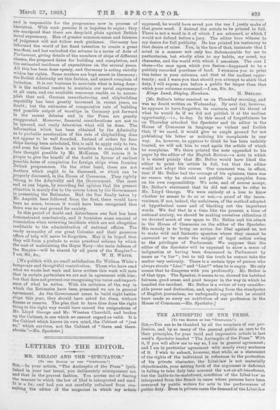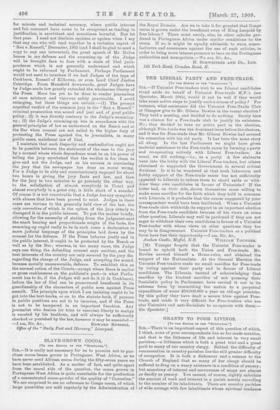THE ANTISEPTIC OF THE • PRESS.
[ToTHE EDITOR or t HZ SPROTATOR."1 Sin,—Yon are to be thanked by all the members of our pro- fession, and by so many of the general public as care to fix their principles, for your lucid and impressive article in last week's Spectator headed "The Antiseptic of the Press." With it, if you will allow me to say so, I am in general agreement ; and I am in particular agreement with nearly every sentence of it. I wish to submit, however, that while, as a statement of the rights of the individual in reference to the protection of his private character, the Libel-law is not materially objectionable, your Setting forth of the argument is deficient in failing to take duly into account the not-at-all-beneficent, but the liable-to-be-maleficent, condition of the Libel-law as Interpreted from the Bench in cases where persons have been tonsured by public writers for acts in the performance of public duty. Even in private cases the demand of the Libel-law
for minute and technical accuracy, where public interest and fair comment have come to be recognised as tending to justification, is exorbitant and sometimes harmful. But let that pass. I need not disclaim egotism or egoism when I say that any one who will read together in a verbatim report of "Rex v. Russell," December, 1905 (and I shall be glad to send a copy to any one interested), the great speech of Mr. Rufus Isaacs in my defence and the summing-up of the Judge will, be brought face to face with a state of libel juris- prudence which is not generally understood and which ought to be reformed by Parliament. Perhaps Parliament would not need to interfere if we had Judges of the type of Cockburn, Russell of Killowen, or even Lord Chief Justice Coleridge. From Mansfield downwards, great Judges have by Judge-made law greatly extended the wholesome liberty of the Press. More has yet to be done to render journalism at once salutary and vigorous safely practicable. I avoid enlarging, but these things are certain :—(1) The prompt. acquittal verdict of the common jury in the "Rex v. Russell" criminal prosecution was sound and just and of good public policy ; (2) it was directly contrary to the Judge's summing- up ; (3) the Judge's summing-up was in accordance with the general principles of law as understood on the Bench and at the Bar when counsel are not called to the higher duty of protecting the Press against the, to journalists, in many public cases, maleficent law of libel.
I maintain that such disparity and contradiction ought not to be possible between the statement of the case to the jury by a counsel whose whole dependence must be on his power of telling the jury unrebuked that the verdict is for them to give and not the Judge, and on his success in convincing the jury that the newspaper has done no moral wrong. For a Judge to be ably and conscientiously engaged for about two hours in giving the jury facts and law, and then for the jury in two minutes to go precisely the other way, to the satisfaction of almost everybody in Court and almost everybody in a great city, is little abort of a scandal. Of course it is not conceivable that a Judge has any sympathy with abuses that have been proved to exist. Judges in these cases are ,victims to the generally held view of the law, the only corrective of which is the option of the jury utterly to disregard it in the public interest. To put the matter briefly, allowing for the necessity of stating from the judgment-seat the exact bearing and proportionate weight of the facts, the summing-up ought really to be in such cases a declaration in more judicial language of the principles laid down by the counsel for the defence. If the Press behaves justly and in the public interest, it ought to be protected by the Bench as well as by the Bar; whereas, in too many cases, the Judge says one thing, the defending counsel says another, and the best interests of the country are only secured by the jury dis- regarding the charge of the Judge, and accepting the sound, because. morally unanswerable, defence. To establish this as the normal action of the Courts—except where there is malice or gross recklessness on the publicist's part—is what Parlia- ment haa. to do, if the Judges will not do it (a /a. Cockburn), before the law of libel can be pronounced beneficent in its guardianship of the characters of public men against Press assault. The principle upon which I am insisting ought to be got into the text-books, or on to the statute-book, if persons in public, positions are not to be immune, and if the Press is not to be hampered in an important function. Any journalist who desires (or tries to exercise) liberty to malign is scouted by his brethren, and will always be sufficiently checked or punished by the law, however it may be amended.—











































 Previous page
Previous page